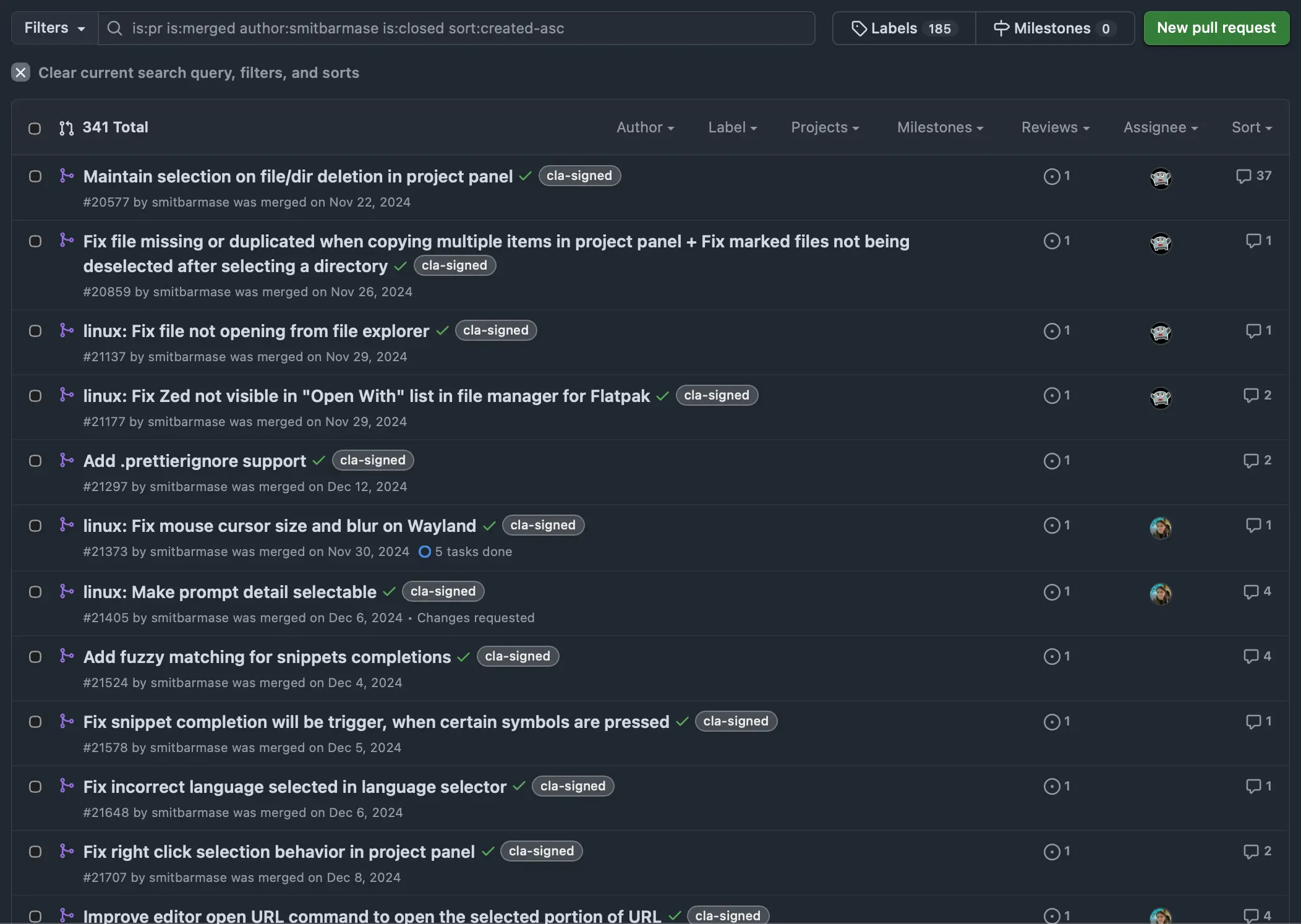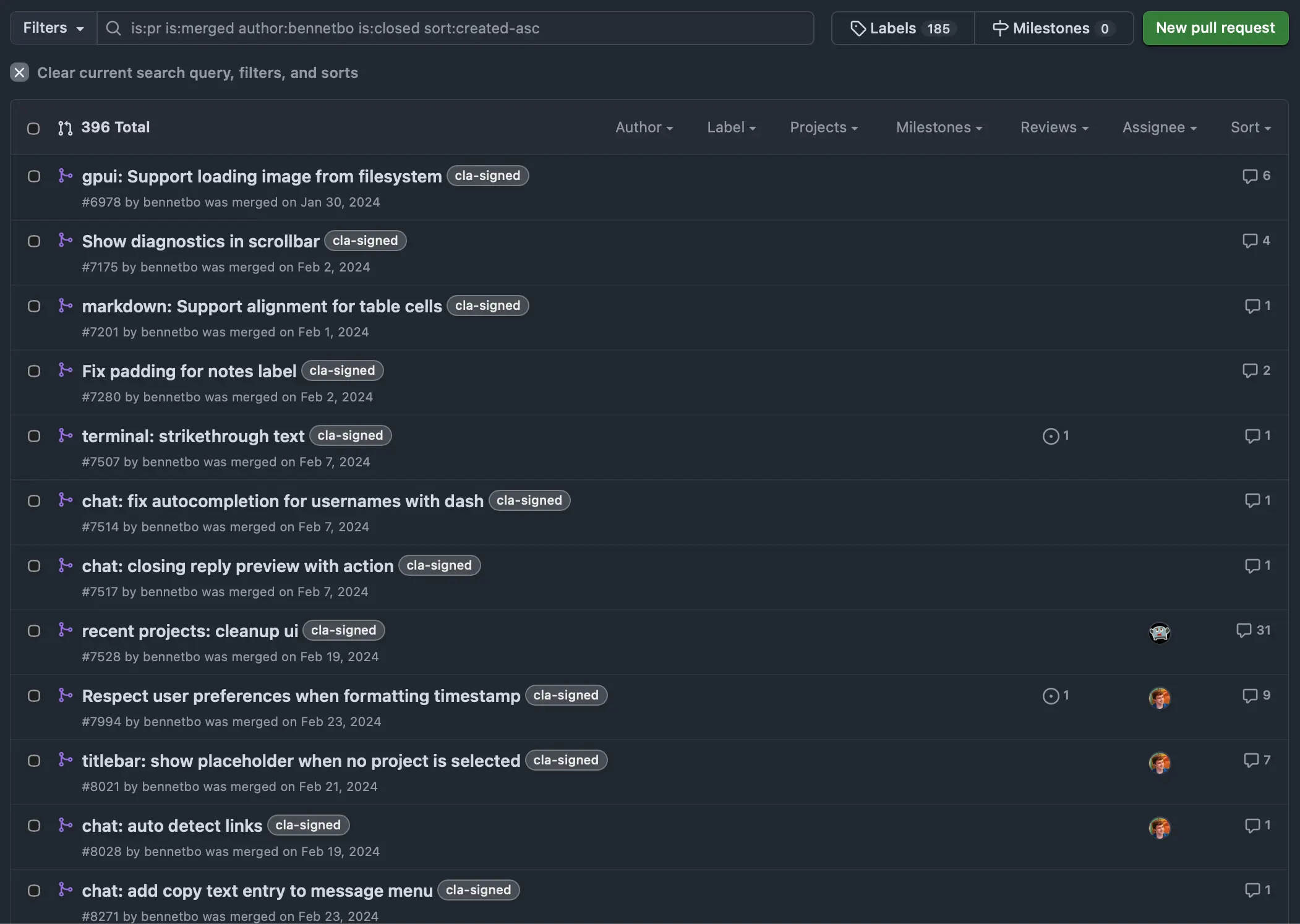In Hired Through GitHub: Part 1, we shared how some of our coworkers landed positions on the team after making significant open source contributions to Zed. But we have so many teammates who've arrived this way, we needed another post! In this edition, Smit Barmase and Bennet Fenner share their different paths into Zed.
Smit Barmase
Joined February 2025
Lives in Bangalore, India, and likes to build games 🎮, and watch movies 📺.
Lives in Bangalore, India, and likes to build games 🎮, and watch movies 📺.
Smit had worked for 3 years as a web developer when he decided to pivot into a new focus. He was interested in working on a performance-first project, and Zed caught his eye:
I left my full-time SWE role to figure out what was next and wanted to use that time to contribute to open source. I had a bunch of projects in my mind that interested me a lot, such as Astro and Bun, but Zed was my first choice. Two things hooked me immediately: "extremely fast," and "from the creators of Atom." I remember the first time typing in Zed, and asking my friend to give it a try because of how snappy it felt.
As Smit began contributing, he chatted with Zed staff like Joseph and Kirill who offered feedback and guidance.
I told Joseph I wanted to contribute and started fixing one annoying bug after another, it started around November 2024. He encouraged me along the way, and Kirill began merging each of my PRs faster than the last, the momentum kept building. Joseph and I stayed in touch and talked everything Zed-related for months.
As a daily Linux user, Smit started by fixing the papercuts he experienced firsthand and adding Linux-focused features. He worked on mouse cursor size and blur issues on Wayland, implemented menus on Linux, and landed many improvements / fixes to the project panel.
Many of these issues had been long overdue—some for over a year—with numerous upvotes (👍) from the community.
Smit hadn't really paired with anyone during this time due to time zone differences, but plenty of his work was reviewed asynchronously by the Zed team, particularly Kirill.
In under three months, Smit shipped 40+ pull requests.
One morning I woke up to an appreciation post from Zed on X. Shortly after, Zed sponsored my work, and when they began hiring for a community role, it all fit right in.
Now at Zed, Smit has had to think differently about his role, though it's been rewarding:
Other than contributing code, my main challenge after joining was figuring out better ways to work with and communicate to the community. Since I represent Zed, how I respond shapes what Zed means to them.
It's a small team with a lot of autonomy, and I learn something new every day. No matter what you're working on, there's always room to grow. The team is incredibly encouraging, and it's inspiring to watch great craft come together right in front of you.
One aspect Smit particularly appreciates about working at Zed:
At Zed, you truly understand your users because you're one of them. It's much easier to make clear decisions about what to build, what to fix, and how to gather feedback.
Beyond the project panel and Linux work, most of Smit's time has been dedicated to fixing bugs in the core editor, including selections, indentation, completions, and language-specific nuances. He's learned a lot from his teammates, such as working with tree-sitter, language servers, and much more.
For Smit, building something that resonates with so many people has been fulfilling.
Thinking of fixing these bugs for so many people filled me with motivation. I've always wanted to work on a piece of open-source software. It's an absolute joy to make a fix that solves people's problems right in front of your eyes, it feels personal and meaningful.
For those considering contributing, he offers this advice:
- If you haven't started contributing yet: pick the smallest bug fix you can find and make your first PR.
- If you've been contributing for a while: don't be afraid to take on big, high-quality work over small, high-quantity tasks.
The Zed team sees when your work creates noticeable impact.

Bennet Fenner
Lives in Darmstadt, Germany, and likes to boulder 🪨.
Bennet, a Computer Science student at TU Darmstadt, discovered Zed through a Reddit post in 2023.
I read the GPUI Blog Post and was nerdsniped into learning a bit of Rust. After that, I found myself frequently checking for new blog posts, and found the vision and technology choices fascinating.
At the time, Zed could only run on macOS.
I remember seeing the Public Beta announcement, but at the time I did not have an Apple machine, so there was no way for me to try out the editor. I bought a MacBook a couple weeks later, since I needed it "for uni". In retrospect, I bought it specifically to try out Zed, but tried to convince myself that I needed it for uni. And that's how I got started, loved it ever since.
From January to March 2024, Bennet made regular visits to Zed's channel tree to learn from and pair with Zed engineers.
I started contributing right after Zed went open source. I opened a bunch of small PRs (showing diagnostics in scrollbar / GPUI fixes / collaboration improvements), around ~20 or so. I basically ended up spending most of my free time hanging out in public channels, my thought: "I can work on this cool open-source project with a bunch of world-class engineers and learn from them for free? Why is (almost) no one taking advantage of this?"
I started pairing mostly with Conrad on collaboration, but also other people (Antonio, Thorsten, etc.). After hanging out and pairing with Conrad in the public channels, he asked me if I would be interested in doing an internship / work for Zed.
Bennet would spend one month as an intern before being asked to join the team in April 2024.
Because he joined via contributor-to-hire instead of through a traditional application, Bennet found onboarding less jarring:
Contributing helped me to get familiar with Zed's collaboration & pairing culture. I learned a lot about the codebase by listening to and pairing with Zed employees. However, it still took me a while to be productive on various tasks after being hired. I was new to Rust and this is the biggest codebase I ever worked on.
Bennet reflects on his experience since becoming a Zed staff member back in March of 2024.
It's been amazing. The whole process of joining felt very natural since I knew most people beforehand. I really enjoy the freedom I still have today—sometimes it feels like I'm still a contributor given how much autonomy we have. The team is world-class—feels like I am working with the most talented and friendly people every day. That has really accelerated my learning and helped me become a better engineer. Also, I obviously love using the product, so getting to work on it is even better. All the technical challenges are super interesting.
Since joining, Bennet has worked on indent guides, preview tabs, and many general text editor core features. Today he's part of the AI team focusing on LLM / agent tasks, and continues to balance working part time at Zed while finishing his bachelor's degree at TU Darmstadt.
Bennet's advice to future contributors:
Don't hesitate to reach out to Zed employees to pair. Most of us much prefer to pair with you on a PR than to review the diff on GitHub. Hang out with us in the public channels!

Different Paths, Same Destination
Smit and Bennet took slightly different routes to contribute to Zed: Smit worked independently, fixing bugs and shipping pull requests that were reviewed asynchronously, while Bennet spent time in public channels, live pairing with Zed engineers. Each route taught them about working effectively at Zed and grew their passion for open-source development.
By hiring through the community, we've learned that the benefits flow both ways. Contributors gain real relationships with the team, deep exposure to our codebase, familiarity with our pairing culture, and ultimately ship code that improves the experience for Zed users around the world. We, in turn, get to see how you think about problems, find solutions, and navigate communication around the work.
If you're curious about contributing, check out these GitHub issues the Zed team has marked as strong first issues to tackle. We look forward to pairing with you soon!
Related Posts
Check out similar blogs from the Zed team.
Looking for a better editor?
You can try Zed today on macOS, Windows, or Linux. Download now!
We are hiring!
If you're passionate about the topics we cover on our blog, please consider joining our team to help us ship the future of software development.